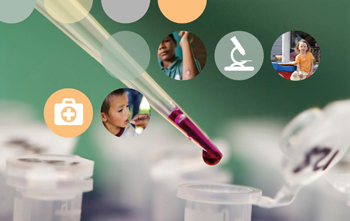MEDIA ADVISORY
David Ruth
david@rice.edu
713-348-6327
Jeff Falk
jfalk@rice.edu
713-348-6775
Baker Institute events to highlight neglected tropical disease issues in US and Mexico
HOUSTON – (Sept. 16, 2015) – Neglected tropical diseases (NTDs) comprise a group of parasitic, viral and bacterial infections that mainly afflict people living in areas of extreme poverty, including some southern regions of the United States and Mexico. Three events at Rice University’s Baker Institute for Public Policy Sept. 29-30 will bring together scientists and policy experts to discuss how NTDs are affecting both countries and determine how the countries can work together to address the problem.
 The events are all being held in conjunction with the Baker Institute’s daylong Sept. 30 conference, “The U.S. and Mexico — Addressing a Shared Legacy of Neglected Tropical Diseases and Poverty,” supported by a grant from the AbbVie Foundation. The events are free and open to the public, but registration is required.
The events are all being held in conjunction with the Baker Institute’s daylong Sept. 30 conference, “The U.S. and Mexico — Addressing a Shared Legacy of Neglected Tropical Diseases and Poverty,” supported by a grant from the AbbVie Foundation. The events are free and open to the public, but registration is required.
What: Student workshop: “Charting a Path in the NTD World.”
The workshop will introduce students to global health advocacy and potential future careers.
When: Tuesday, Sept. 29, 1-5 p.m.
Where: Rice University, Baker Hall, Doré Commons, 6100 Main St.
RSVP for the public: http://bakerinstitute.org/events/1733/
What: Keynote address: “U.S. NTD Strategy and U.S.-Mexico Border Health Projects.”
Mitchell Wolfe, deputy assistant secretary for the Office of Global Health in the U.S. Department of Health and Human Services, will discuss US government projects and initiatives aimed at combating NTDs in the United States and at impacting U.S.-Mexico border relations.
When: Tuesday, Sept. 29, 5-7:30 p.m.
Where: Rice University, Baker Hall, Doré Commons, 6100 Main St.
RSVP for the public: http://bakerinstitute.org/events/1732/
What: Conference: “The U.S. and Mexico — Addressing a Shared Legacy of Neglected Tropical Diseases and Poverty.”
The conference will examine the social and political barriers to the control and prevention of NTDs and determine ways that the U.S. and Mexico can work together to address these diseases. Highlights include a keynote address by Mercedes Juan Lopez, the Mexican secretary of health, and plenary lectures from Texas state Rep. Sarah Davis, R-West University Place, and Roberto Tapia Conyer, director-general of the Carlos Slim Foundation.
When: Wednesday, Sept. 30, 8 a.m.-5 p.m.
Where: Rice University, Baker Hall, Doré Commons, 6100 Main St.
RSVP for the public: http://bakerinstitute.org/events/1707/
NTDs are a group of parasitic, viral and bacterial infections that afflict mainly those living in extreme poverty. An estimated 1.6 million households in the U.S. and 5 million people in Mexico live on less than $2 per person per day. An estimated 12 million Americans live with at least one NTD. NTDs tend to be chronic, debilitating infections that leave their victims malnourished, disabled and disfigured and often result in social stigma and a limited capacity to work or attend school.
Rather than NTD importation from across the United States’ southern border, as many erroneously believe, the country now has high levels of transmission of NTDs within its borders, according to event organizers. The U.S. and Mexico share many social and environmental determinants of NTDs, including extreme poverty, the presence of insect vectors and climate change. Despite the fact that NTDs impact public health and local economies in both the U.S. and Mexico, only a few initiatives are working to prevent these diseases, organizers said. These events will explore deeply how NTDS have become widespread in both the U.S. and Mexico, and how to best tackle and control these afflictions.
These events are organized by the Baker Institute’s Center for Health and Biosciences and the Mexico Center; the National School of Tropical Medicine at Baylor College of Medicine; and the END Fund, in partnership with the Sabin Vaccine Institute and Texas Children’s Hospital Center for Vaccine Development. The symposium and conference events are supported by a grant from the AbbVie Foundation. Student support is provided by Burt and Deedee McMurtry.
Members of the news media who want to attend should RSVP to Jeff Falk, associate director of national media relations at Rice, at jfalk@rice.edu or 713-348-6775.
For a map of Rice University’s campus with parking information, go to www.rice.edu/maps. Media are advised to park in the Central Campus Garage.
-30-
Follow the Baker Institute via Twitter @BakerInstitute and @BakerCHB.
Follow Rice News and Media Relations via Twitter @RiceUNews.
Founded in 1993, Rice University’s Baker Institute ranks among the top 10 university-affiliated think tanks in the world. As a premier nonpartisan think tank, the institute conducts research on domestic and foreign policy issues with the goal of bridging the gap between the theory and practice of public policy. The institute’s strong track record of achievement reflects the work of its endowed fellows, Rice University faculty scholars and staff, coupled with its outreach to the Rice student body through fellow-taught classes — including a public policy course — and student leadership and internship programs. Learn more about the institute at www.bakerinstitute.org or on the institute’s blog, http://blogs.chron.com/bakerblog.


Leave a Reply